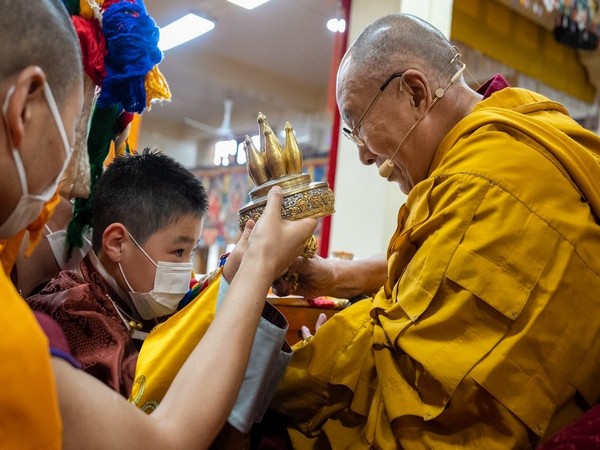Shift in Mongolia's Buddhist leadership to determine its relationship with China
An immediate shift in Mongolia's Buddhist leadership was seen after Tibetan spiritual leader Dalai Lama recognised an 8-year-old US-born Mongolian boy as one of the highest spiritual leaders in Buddhism in March this year, according to several media reports.

- Country:
- China
An immediate shift in Mongolia's Buddhist leadership was seen after Tibetan spiritual leader Dalai Lama recognised an 8-year-old US-born Mongolian boy as one of the highest spiritual leaders in Buddhism in March this year, according to several media reports. As a result, this shift in Buddhist leadership which became visible also holds the potential to shift the direction of Mongolia's relationship with China, according to a report of Modern Diplomacy.
In an opinion in Modern Diplomacy, Victoria Jones, a Senior Research Fellow at the Asia-Pacific Foundation, an international policy assessment group based in London writes that the young boy will serve as the representative of Mongolia's dominant religion, Tibetan Buddhism, and he would become a much more significant figure if the current Dalai Lama were to unexpectedly pass away. "The move also reverberates more widely in terms of the future of Tibetan Buddhism at large, especially when it comes to the selection of the next Dalai Lama. It is yet another reminder to Beijing that the Tibetan resistance movement is alive and well--and it now has a fresh new figurehead who holds meaningful religious authority," she writes.
"The Mongolian government itself has not yet commented on this latest announcement, perhaps to avoid upsetting China, as Beijing has repeatedly punished Mongolia for previously hosting the Dalai Lama throughout the past decades," opines Jones. China closed a border crossing with its neighbour after the spiritual leader's 2002 visit, and during his 2006 tour, flights from the Chinese capital to Mongolia were halted.
China's most recent and severe retaliation against Mongolia for a Dalai Lama visit took place in 2016. The Dalai Lama allegedly recognised the 10th Khalka Jetsun Dhampa Rinpoche that year, but due to his youth, he reportedly felt it was too soon to properly present him to the world, Modern Diplomacy reported. "Beijing did not merely hit Mongolia with a scolding and stern word, but real, practical consequences as well. One week after the Dalai Lama's visit, China imposed fees on Mongolian commodity imports and extra transit costs on products crossing into Inner Mongolia. Moreover, Beijing closed a key border crossing with Mongolia, leading to congestion and serious traffic jams and leaving truck drivers stuck in freezing temperatures for days on end," Jones writes.
Moreover, Beijing also meddles actively in the religious issues of Mongolia in addition to using its economic influence over that nation. China encourages interactions with Mongolian Buddhist clergy as a means of strengthening its hold; more specifically, it does so by focusing on and supporting sects that are antagonistic to the Dalai Lama. It's also important to take into account China's worries over Mongolia's ethnic composition. In reality, Beijing faces additional friction because there are more Mongols living inside China than in Mongolia.
"The CCP's response to this perceived problem has been to crack down on Mongol culture in Inner Mongolia, for instance, by passing a law in 2020 prohibiting teachers from using the Mongolian language--a policy reminiscent of the one instituted in the so-called night-stay schools in Tibet-- as part of an effort to make Han Chinese and Mongol culture indistinguishable," Jones writes in Modern Diplomacy. This action sparked protests in Inner Mongolia, as China's crackdown was unaccepted by the Mongolians.
In terms of Tibetan Buddhism, both historically and currently, Mongolia is of utmost significance. The word "Dalai" actually comes from the Mongolic language and means "ocean," "vast," or "great," Jones said. The Dalai Lama acknowledged the 8-year-old as Khalkha Jetsun Dhampa Rinpoche's reincarnation during his visit to Mongolia a few years ago in 2016.
The Mongolian boy named the 10th Khalkha Jetsun Dhampa Rinpoche had visited Dharamshala along with a group of Mongolian devotees and attended the teachings of the Dalai Lama and preliminary Chakrasamvara empowerment on March 8-9 this year. The Office of the Dalai Lama in early this March released a photograph of the young boy Lama with a caption that read, "The reincarnation of Khalkha Jetsun Dhampa Rinpoche of Mongolia presenting traditional offerings to His Holiness the Dalai Lama at the start of the preliminary Chakrasamvara Empowerment at the main Tibetan temple in Dharamshala."
Moreover, while reading a paper/ letter on March 8 during the teachings, Dalai Lama said, "Khalkha Jetsun Rinpoche is here with us today. He came here to receive the Chakrasamvara empowerment, the previous Jetsun Dhambas practice mainly Chakrasamvara and it's an auspicious occasion." (ANI)
(This story has not been edited by Devdiscourse staff and is auto-generated from a syndicated feed.)










